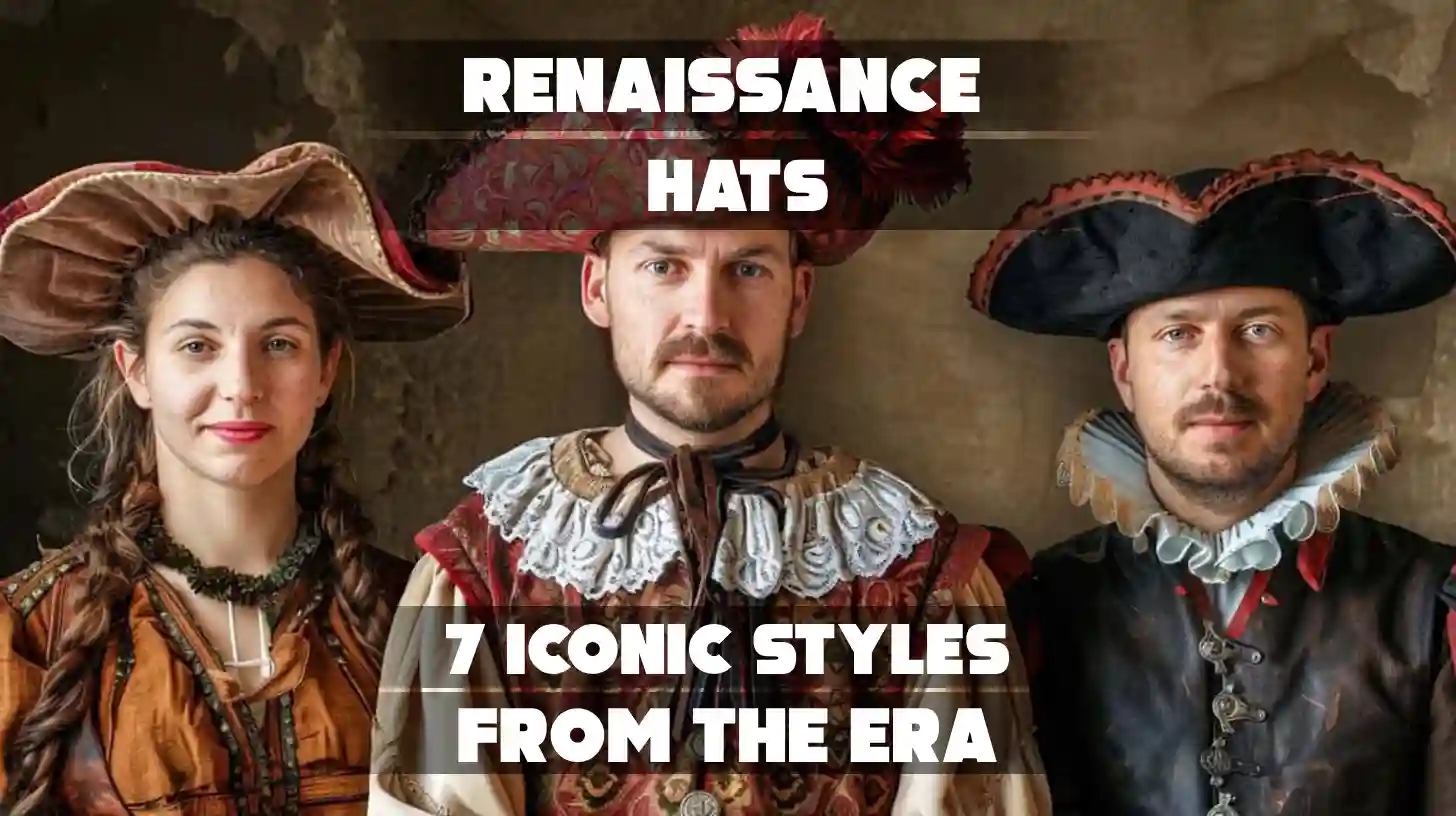Ever wondered about the world of the Renaissance? Discover how Renaissance hats showcase the elegance and artistry of this fascinating era.
Whether for research, reenactment, or personal interest, we’re here to guide you through these iconic headpieces.
Here’s the Plan:
- Explore historical roots
- Discover distinct styles for men and women
- Learn about key materials and craftsmanship
- Uncover the social significance of different hats
Continue reading to explore the secrets of Renaissance hats and imagine yourself wearing one, capturing the era’s grace and sophistication.



Historical Roots of Hats in the Renaissance

Renaissance hats, from Renaissance caps to Italian Renaissance headwear, became symbols of both style and status. These hats of the Renaissance were traditionally worn with gold embellishments and plumes, offering a dashing appearance.
Whether you’re looking for the perfect Italian Renaissance hat or a more medieval style like cavalier hats, there’s a variety to choose from. Renaissance-era hats ranged from simple linen caps to ornate crowns, often adorned with two grommets for fit.
Snoods, muffin hats, and veils were also popular. With so many options, you’ll surely find the right hat to complete your period outfit.

Popular Renaissance Hat Styles
1. The Beret

The beret, a popular hat style during the Renaissance, was worn by both men and women. Made from wool or felt, it sat flat on the head, often adorned with a small feather or other decorative embellishments. Known for its dashing appearance, the beret became a symbol of creativity and free thinking, often seen on artists and intellectuals.
As a type of Italian Renaissance headwear, it was a timeless piece, matching various period outfits. Whether in black or white, the beret was surely a staple among the hats of the Renaissance, celebrated for its simplicity and elegance.
2. The Chaperon

The Chaperon, a hooded hat worn by men during the medieval and Renaissance eras, was a symbol of nobility and wealth. Made from wool or silk, it covered the head and neck, often paired with a long, flowing cloak to complete a dashing appearance.
As part of Renaissance headwear, the Chaperon was traditionally worn by the royalty and those of high social rank. Its design featured a unique structure, with two grommets on the side, and it became an iconic piece of period outfits, reflecting both fashion and status in the Renaissance market.
3. The Tricorne Hat

The tricorne hat, popular during the Renaissance, was a bold and stylish choice for men. Featuring a distinctive three-cornered design, it was typically made from wool or felt, often adorned with a ribbon or feather. This hat was traditionally worn as part of a formal outfit, symbolizing sophistication and high status.
With its sharp angles, the tricorne added a dashing appearance to any ensemble, making it a favorite among the nobility and royalty. Whether in black or white, the tricorne became a staple in the hats of the Renaissance, blending both practicality and elegance.
4. The Montera

The montera, a popular headwear worn by women during the Renaissance, featured a distinctive round shape, often crafted from velvet or silk. It was adorned with jewels or other decorative embellishments, adding a touch of luxury and elegance to the wearer’s look.
As part of a formal outfit, the montera symbolized high status and was commonly worn by the royalty and aristocracy. Whether in black or white, this hat was a perfect match for many styles of Renaissance fashion, making it a key part of the Renaissance hat selection for women seeking a great look.
5. The Bicorn Hat

The bicorn hat, a striking piece of headwear worn by men during the Renaissance, featured a distinctive two-pointed design. Crafted from wool or felt, it was often paired with a long coat or cloak, creating a powerful and commanding look.
Symbolizing power and authority, the bicorn was commonly seen among royalty and the elite. Whether in black or white, this hat became a perfect Renaissance hat for those looking to make a bold statement. With its sharp design and great fit, it stood out as a key piece in any period outfit.
6. The Coif
The coif, a hooded hat worn by women during the Renaissance, was crafted from linen or silk, covering the head and neck. It was traditionally worn as part of a larger, modest outfit, symbolizing modesty and piety.
The coif was a key element of Renaissance-era hats, reflecting both religious values and societal expectations. Whether adorned with a veil or kept simple, it was a practical yet elegant piece of headwear, perfectly complementing the wearer’s period attire. Discover the variety of styles and find the perfect match for your Renaissance hat selection.
7. The Gable Hood

The gable hood, a distinctive hat worn by women during the Renaissance, featured a unique triangular shape that set it apart from other headwear of the time. Made from silk or velvet, it was often adorned with jewels or other decorative embellishments, adding a touch of luxury to the wearer’s period outfit.
Crafting Renaissance Headwear
Common Materials

Renaissance hats were made from materials like silk, velvet, leather, felt, gold threads, and lace, reflecting both style and status. Silk was lightweight and ideal for intricate designs, while velvet offered richness, popular among the upper classes. Leather was used for practical hats, and felt was common in men’s hats for its durability.
Gold and silver threads added luxury, and lace was used for decorative patterns, especially on women’s headwear. Imported from regions like Italy and Spain, these materials made hats a symbol of wealth and refinement.
Techniques and Craftsmanship

The craftsmanship of Renaissance hats involved skilled techniques like felting, blockmaking, dyeing, and embroidery. Felting pressed wool fibers into dense, sturdy fabric, allowing for a variety of styles. Blockmaking carved wooden blocks to shape hats precisely, ensuring a perfect fit and form.
Dyeing and painting added vibrant colors to hats, reflecting the wearer’s personality and status. Embroidery adorned women’s hats with intricate designs, while trimming with feathers, ribbons, and other embellishments added luxury and style, making each piece a true reflection of Renaissance headwear craftsmanship.
See Also Italian Renaissance Hats
Types of Renaissance Hats Across Regions
Italy

During the Italian Renaissance, headwear styles varied by region. In Florence, the pillbox cap was popular for its simple, rounded design, often made from felt or fabric and featuring minimal decorations. The beret, soft and rounded, was also common, crafted from materials like velvet or wool and sometimes adorned with feathers or jewels.
In Venice, the hennin, a tall, pointed hat with veils and gold accents, symbolized luxury and high status. Milan favored practical felt caps, reflecting functional elegance with minimal adornment. Each style reflected regional tastes, from understated to ornate.
France

In France, headwear styles varied between Paris and the Loire Valley, reflecting regional preferences and social status.
In Paris, the chaperon was a popular choice, featuring a hood with a draped tail and worn in various medieval styles. This versatile piece was commonly worn by men throughout the period. Berets and felt caps were also popular, offering a practical yet stylish option, especially in the late 15th and early 16th centuries.
In the Loire Valley, the nobility preferred ornate headwear adorned with feathers and gold accents, signaling their wealth and high status.
See Also Italian Renaissance Dresses
England

In England, headwear styles varied between London and Yorkshire, reflecting regional needs and preferences. In London, the flat cap was a popular choice for men, with its low crown and small brim. This practical hat was worn across all social classes, suited for various activities and weather conditions.
In Yorkshire, especially in rural areas, wide-brimmed hats made from wool or felt were common. These practical hats provided essential protection from the elements, ideal for outdoor and agricultural work.
Spain

In Spain, headwear styles differed between Madrid and Andalusia, reflecting both practicality and style.
In Madrid, the montera was a popular choice for men. This brimless headpiece, made from velvet or fur, was valued for its versatility and practicality, suitable for both casual and formal occasions. Women in Madrid favored conical hats, which were more elaborate than the hennin, often adorned with lace or decorative jewels, adding sophistication to formal outfits.
In Andalusia, wide-brimmed hats made from straw or felt were common, offering essential shade from the sun, perfect for the region’s bright, sunny climate.

Renaissance Hats: A Recap
Renaissance headwear blends social status, craftsmanship, and regional identity. Ornate court pieces and practical hats for common folk each balance function with fashion.
The influence of Renaissance hats continues in modern fashion, where rich materials and intricate ornamentation inspire designers. This ongoing impact highlights the enduring historical significance of these styles.
More than just decoration, Renaissance headwear signified social rank and professional roles, reflecting artistic and cultural achievements. These pieces reveal a deep connection between personal identity and historical context.




